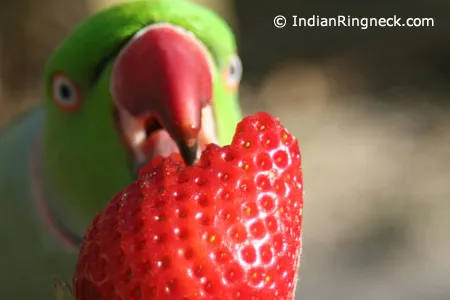The Indian Ringneck parrot, known for its intelligence and vibrant personality, thrives on a diverse and balanced diet. While often perceived as easy to please, providing a varied intake of fresh fruits, vegetables, seeds, and pellets is crucial for their long-term health and well-being. This guide explores the optimal diet for your captive Indian Ringneck, drawing insights from their natural feeding habits and expert recommendations.
The Natural Diet of a Wild Ringneck
In their natural habitat, Indian Ringnecks are opportunistic eaters, their diet consisting of fruits, blossoms, and seeds. This varied consumption often leads to them being considered agricultural pests in regions like Southeast Asia and California, where they are known to damage crops before harvest. When fresh offerings are scarce, they supplement their diet with greens like dandelion leaves. Some wild ringnecks also consume insects to obtain essential protein. Their adaptability means they readily explore a wide range of edible items available in their environment.
Crafting a Healthy Diet for Your Captive Ringneck
Establishing a nutritious diet for your pet Indian Ringneck doesn’t have to be complex. A combination of fresh fruits, vegetables, seeds, and high-quality pellets offers the best nutritional balance for a long and healthy life. Relying solely on seeds or pellets can limit essential nutrients and lead to health issues over time.
Seeds: A Part of the Puzzle
Seeds are a natural component of an Asiatic parrot’s diet and should not be entirely excluded. However, a diet consisting solely of seeds is high in fat and can significantly shorten your parrot’s lifespan. When offered in moderation as part of a balanced diet, seeds are safe and beneficial.
Rotating Seeds and Pellets
To ensure your Ringneck benefits from each food type, it’s advisable to rotate between seeds and pellets rather than mixing them. For instance, you can offer seeds for four days and pellets for three days. This approach allows your parrot to fully consume and benefit from each food source. Over-reliance on pellets alone can lead to nutrient overdose, while moderation in both seeds and pellets helps prevent this. If your Ringneck is unaccustomed to pellets, introduce them gradually to avoid self-starvation.
 A close-up of a colorful Indian Ringneck parrot eating a piece of apple.
A close-up of a colorful Indian Ringneck parrot eating a piece of apple.
The Importance of Fruits and Vegetables
Fruits are often a favorite among Indian Ringnecks, with apples and grapes being particularly enjoyed. Offer a variety of fruits such as oranges, kiwis, pears, mangoes, and melons, ensuring they are fresh and free from spoilage. Fruits provide essential antioxidants and contribute to overall health.
Equally important are vegetables. Raw baby carrots are a great option, providing hours of enjoyable munching. Leafy greens should also be a staple, offered whole for your parrot to tear into. Cooked and cubed squashes like pumpkin and zucchini are also well-received. Be creative and consistent in offering a wide array of vegetables.
Incorporating Protein
A small amount of protein is beneficial for your Ringneck’s diet. Cooked, shredded turkey or chicken offered once a week can provide this essential nutrient. Ensure protein sources are removed from the cage within an hour to prevent spoilage. When preparing meals, consider incorporating vegetables and fruits alongside your own food, saving time and providing healthy options for your parrot throughout the week.
A well-balanced diet is key to ensuring your Indian Ringneck can live a long and vibrant life, potentially into its 20s. Avoid oils, salts, and preservatives in any food you prepare for your parrot. By offering a diverse and nutritious diet, you are investing in your feathered companion’s health and happiness.
